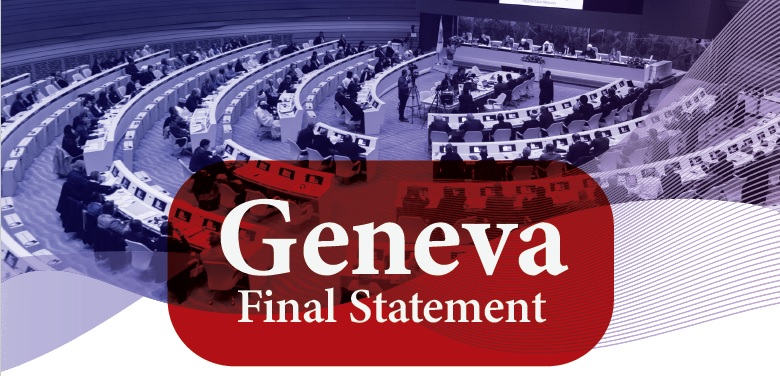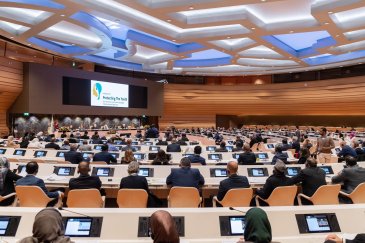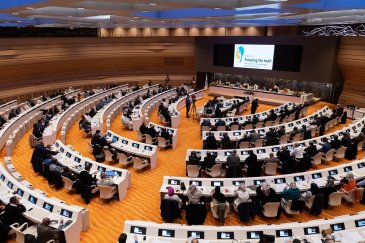Geneva Final Statement

Geneva Final Statement
Initiatives for protecting youth against extremist and violent thoughts,
The promotion of religious freedoms and the values of tolerance
And countering hatred and marginalization
For action called for by His Excellency the Secretary General of the Muslim World League, Sheikh Dr. Muhammad Bin Abdulkarim Alissa, the International Conference on Initiatives to protect young people against extremist and violent ideas: implementation mechanisms was held at the United Nations Headquarters in Geneva on Tuesday and Wednesday, February 18-19, 2020.
A great number of people involved in the topic of the conference, including senior officials working in government and private sectors around the world, along with “religious people, politicians, thinkers and security personnel, in addition to academic practitioners in the field of education, psychology, and social scholars attended the conference.”
Prominent religious and political leaders that included heads of governments, presidents of parliaments and a number of parliamentarians and ministers concerned with issues of extremism, violence, terrorism, religious freedoms, and combating hatred and marginalization from countries of the world.
The conference themes dealt with a number of vital initiatives in the topic at hand and other related topics. The invited guests spoke through open dialogues; this was assisted in advance through the good preparation of the participating speakers in the conference initiatives. They shared very useful information and ideas, thereby enriching the discussion sessions, in addition to very important suggestions, many of which are "missing links" in the diagnoses and careful analysis of a number of problems related to the topic of the conference, while giving key proposals to their solutions.
The conference issued the following recommendations and decisions:
1- Urge educational institutions around the world to create curricula "with interactive activities" taught by trained teachers specialized in formulating the minds of children and young adults in a sound manner (since this is considered an important factor in achieving stability, harmony, community development; in particular national reputation, and the future of human peace in general). However, these interactive approaches must emphasize he following:
a) Instill the firm belief in the inevitability of difference, diversity, and pluralism among people, since within its positive framework; it represents enrichment to mankind that boosts their capabilities and unity.
b) To strongly convince people that religious, ethnic, intellectual and civilizational clash represent a great menace to national security and world peace, and harmony among nations and peoples in general, and national societies in particular. This idea must be supported by profound evidence learned from human history.
c) To cleanse children's and young people's schools curricula from any historical texts or facts that would encourage conflict and hatred and incite hostility and racism.
d) Emphasis must be put on the objective equality among human beings, however, preference should be set equally among those who have great values, creativity and benefit to humanity. Yet, these should not contradict national affinity that constitutes a priority in loyalty, benefit and sacrifice.
e) To emphasize the importance of mutual respect between all human diversity as being an important ground for peace and harmony of nations and societies.
f) To provide and train students on skillful dialogue and how to deal with negative ideas and practices, while at the same time highlighting the importance of the value of forgiveness and tolerance.
g) Accentuate utter rejection of any thought that foster or call for hatred, racism, exclusion and marginalization, under any pretext.
2- Responsible authorities in each country must create effective programs to enhance the family’s role in shaping the mindset of children and young adults and directing towards a more pacifist way.
3- Responsible authorities in each country must endorse effective programs and form multiple partnerships to bridge the negative aspects of religious, cultural and ethnic divides in countries of diversity that suffer from a problem or a threat in the issue of integration.
4- Enact legislation to prevent hate speech, racism and marginalization, giving the right of the national state to take precautions that prevent any method that targets its culture or change its national demographic shaped by the majority without affecting this right to citizenship rights in particular and human rights in general.
5- Religious and intellectual institutions must take steps to confront the ideas of extremism, violence and terrorism by looking into the details of their ideology and dismantling them in depth and with clarity.
6- Enacting legislations to prevent any method that incites sheer emotions denuded of awareness vis-à-vis extremism, violence and terrorism.
7- Inviting all platforms of religious and intellectual influence to present a speech that goes beyond addressing feelings, emotions and spirit to address logic and reality.
8- It is prohibited to export religious fatwas and religious ideas outside the jurisdiction of their spatial circumstance on the basis that enlightened religious thought takes into account the change of fatwas and sermons according to time, place and conditions. Thus, religions came as a mercy to the worlds, kind to the people and seeking to achieve their interests and improve their conditions. This matter represents an important and sturdy base in achieving peace and harmony.
9- To prohibit any religious financing that comes from abroad for the benefit of certain internal parties.
10- To prohibit the training of clerics outside their spatial conditions or recruiting trainers from abroad.
11- To prevent any foreign guardianship of any of the religious centers, including those that use a non-religious name and practice religious works. Those centers should implement effective programs to confront ideas of religious extremism, and be actively effective also in promoting national harmony.
12- The conference recommends the establishment of a center for civilizational communication in Geneva to serve as a global platform for dialogue, promoting friendship and cooperation between nations and peoples, as well as bridging the negative religious, cultural and ethnic loopholes. This should be accomplished through the base of religious commonalities in particular and humanitarian in general, that will guarantee our world to live in peace and harmony. The center must be multicultural representing religious, ethnic and other diversities.
13- Enact legislation to prevent any incitement or hostility towards religions and races, including Islamophobia and anti-Semitism.
14- Urge religious leaders to organize youth activities for dialogue and work on religious and humanitarian partnerships to support efforts to world peace, religious and ethnic harmony, and consolidating the alliance of civilizations.
15- Religious freedom is a human right that cannot be neither forced on others nor forfeited. No method of abuse or marginalization may be practiced because of it, because there is no compulsion in religion.
16- The erroneous practices committed by some adherents of religions do not express religions themselves.
17- Values with their openness, tolerance, and cultural logic are the real victors in the objective dialogue.
18- Man was not created evil, racist, or hateful, however the negative aspects of education, family, and societal environments, and the negative political debates, are what create these negative morals.
19- Disdain of religions is an absurd practice with a long history of constant confrontation leading to the condemnation of its methods.
Emphasis must be stressed on the importance of interfaith dialogue, respect for opinion and a religiosity within an ethical framework.
This contempt has only generated the clash of civilizations and the escalation of extremism on both sides. Yet, the loser in all of this is everyone, in addition to the threat posed to the security of states and societies through the counter reactions of violent extremism.
20- To urge "religious leaders" and "intellectual, social and human rights institutions, as well as, relevant and interested - international, governmental and civil leanings," to elevate mottos and initiatives for tolerance and the alliance of civilizations to make them achieve practical steps through joint international programs characterized by effectiveness and solemnity to exceed the due human rights entitlements to reach the true meaning of kindness and tolerance, and the cultural alliance through a tangible impact that can be gaged and subjected to evaluation.
21- The recommendation - in general terms - to adopt the following initiatives based on their proposed implementation mechanisms:
a) Initiative: friendship and cooperation between Nations and Peoples "for a more understanding and peaceful world ... and more harmonious and integrated societies".
b) Initiative: comprehensive education for behavioral training in pre-adulthood.
c) Initiative: Religious behavior "between the escalation of emotion and weak awareness".
d) Initiative: The family as an incubator, and a major component of children and young adults.
e) Initiative: Peace of Civilizations.
f) Initiative: Islamophobia, "Diagnosis, Analysis and Treatment."
g) Initiative: Neo-Nazis and Anti-Semitism, "Diagnosis, Analysis and Treatment."
h) Initiative: Shaping civilized behavior among religious youth.
i) Initiative: Causes and treatment of extremist religious youth.
j) Initiative: How do we eliminate violence and terrorism?
k) Initiative: errors and repercussions in the diagnosis and treatment of religious freedoms.
l) Initiative: idealism and realism.
m) Initiative: errors in youth religious thinking and treatment.
n) Initiative: between soft power and hard power in combating violent extremism.
o) Initiative: Dismantling the negatives of the collective mind "A study in the case of the religiosity of Muslim youths".
p) Initiative: "Marginalization and Poverty" as causes of extremism and violent extremism, "diagnosis, analysis and treatment".
q) Initiative: "Addressing the inferences of extremism with religious texts and historical facts." The initiative included analyzing the reasons for the failure of the efforts to combat extremism in the past ten years.
r) Three initiatives related to: "Addressing the use of violent extremism by the new media."
s) Initiative: "Correct statistics and measurements in the studies of extremism and violent extremism."
t) Initiative: "Assigning responsibility, defining tasks and measuring results in cases of combating extremism and violent extremism."
u) Initiative: "The ideal security dealing with cases of extremism and violent extremism" This initiative took into consideration the legislative and social disparity between countries.
v) Initiative: "Evaluating international efforts to combat violent extremism and terrorism."
w) Initiative: "Shared Values".
x) Initiative: "Religious Discourse that Makes Peace".
y) Initiative: "Europe and Islam".
z) Initiative: "Integration Ministries in Europe".
aa) Initiative: "Why the fear of Islam and why anti-Semitism?"
22- To refer the remainder of the initiatives to further study and evaluation, and then present them at the second conference meeting.
23- The conference administration will set up a "coordination" committee to follow up on the implementation of the conference’s decisions and recommendations, and to submit a periodic report thereof.
| Attachment | Size |
|---|---|
| Download from here (1.85 MB) | 1.85 MB |




